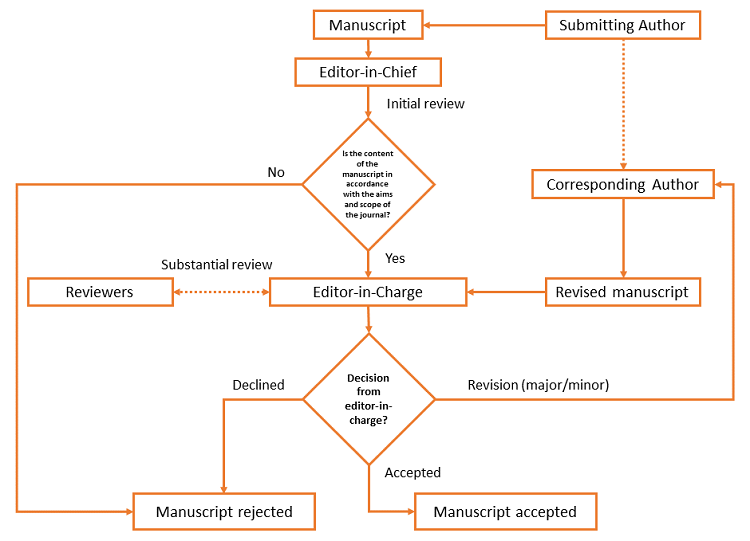Peer-Review Policy
The peer-review process is the core of scientific publication, relying on peer review who has the same area of expertise as the manuscript's topic. Thus, both the Editor-in-Charge and the peer-reviewers are important figures to ensure the peer-review process goes well. The peer-review process in the Journal of Molecular Docking applies as follows:
- Submitting author submits manuscript via OJS Journal of Molecular Docking.
- Editor-in-Chief Conduct an initial review to assess the suitability of the manuscript's contents with the aims and scope of the Journal of Molecular Docking. If the manuscript does not match, the Editor-in-Chief will immediately reject the article (desk rejection). Those rejected at this stage also are insufficiently original or have serious scientific flaws.
- If the manuscript is by its aims and scope and meets the minimum criteria, the Editor-in-Chief will assign one editor to continue the peer-review process of the manuscript. Editor-in-Charge is an editor whose areas of expertise match the substance of the manuscript. Although very rare, it is entirely feasible for an exceptional manuscript to be accepted at this stage.
- Editor-in-Charge asks 2-3 reviewers with appropriate areas of expertise to conduct a substantial review of the manuscript. The reviewer will be asked to evaluate whether the manuscript is scientifically sound and coherent, whether it duplicates the already published works, and whether or not the manuscript is sufficiently clear for publication. Reviewers are not expected to correct or copyedit manuscripts since language correction is not part of the peer-review process and will be done by Editor-in-Charge. The selection of reviewers is made by ensuring there is no conflict of interest between authors and reviewers. One is ensuring that the authors and reviewers are not from the same institution since the method used is double-blind peer review. The peer-review process by reviewers is estimated to take 4 to 8 weeks.
- After obtaining the reviewers' consideration, the Editor-in-Charge decides to accept, reject, or return it to the authors via the corresponding author for revision. There are two possible types of revision: minor and major. Minor revisions indicate that the Editor-in-Charge will review the corrected results from the authors without involving the previously on-duty reviewers. In contrast, the major revisions suggest that previously on-duty reviewers will review the authors' improvements for re-examination before being forwarded to the Editor-in-Charge for a final decision.
- After the authors make revisions, the Editor-in-Charge re-evaluates the manuscript. If needed, especially if the previous decision was a major revision, the Editor-in-Charge can conduct a 2nd round review.
- The final decision to accept or reject the manuscript rests with the Editor-in-Charge, taking into account the previous recommendations from reviewers, manuscript revisions from the authors, and other things required, such as a similarity level of not more than 20%. The Editor-in-Charge decision is final, and the authors are not allowed to challenge any of the final Editor-in-Charge decisions. The average time from initial submission to first decision is usually between 6-10 weeks. If the revision process goes smoothly, the average time between submission and publication of articles is 12-16 weeks.

Becoming a Reviewer
If you are not currently a reviewer for the Journal of Molecular Docking but would like to be added to the list of reviewers, please get in touch with us. The benefits of reviewing for Journal of Molecular Docking include the opportunity to see and evaluate the latest work in the related research area at an early stage and to be acknowledged in our list of reviewers. You may also be able to cite your work for the Journal of Molecular Docking as part of your professional development requirements. Journal of Molecular Docking's reviewers are volunteers who contribute their expertise to the science. Thus no financial payments are made. If you are interested in becoming a reviewer in the Journal of Molecular Docking, please get in touch with jmd@umpr.ac.id.